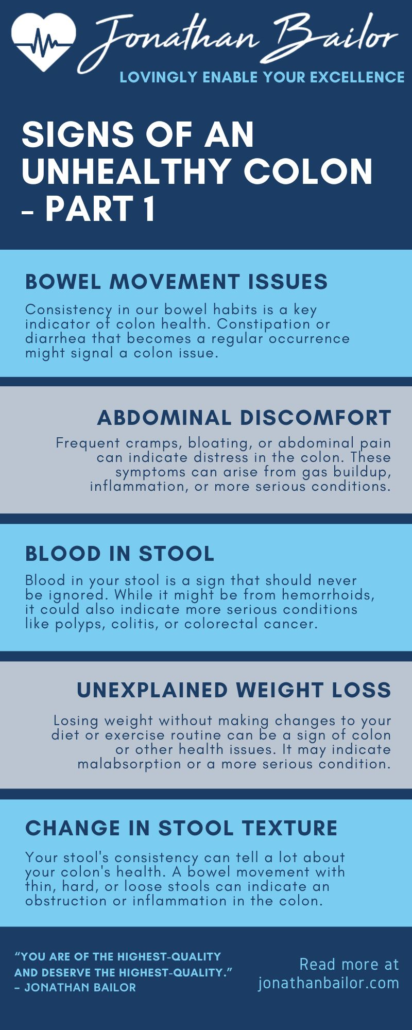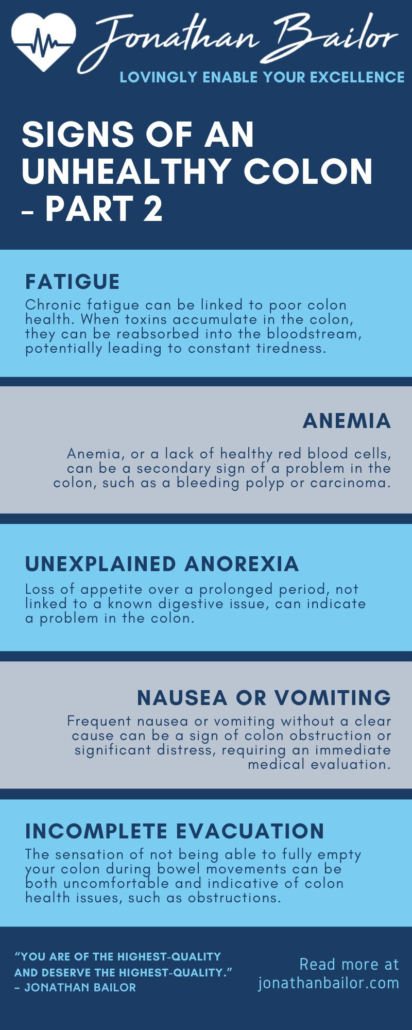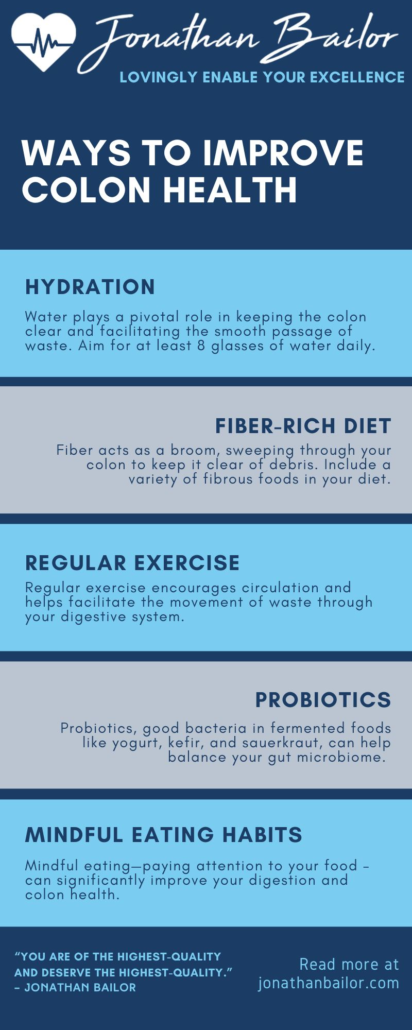10 Warning Signs of an Unhealthy Colon and What to Do About It
Embark on a transformative journey into the depths of digestive wellness with this Colon Health Guide by Jonathan Bailor. In an era where wellness can sometimes fall by the wayside amidst our bustling lives, tuning into our body’s subtle signals is more crucial than ever. The colon, a linchpin in our digestive orchestra, plays a pivotal role not just in nutrient absorption and waste elimination but also as a habitat for our gut microbiome—a complex community of microorganisms that significantly influences our overall health.
Understanding the symbiotic relationship between a healthy colon and a balanced gut microbiome sheds light on why colon health is not just a matter of digestive comfort but a critical aspect of our immune function, mood regulation, and even disease prevention. It’s a dialogue between our body and the billions of microbes that reside within us, each affecting the other in profound ways.
This narrative is not solely about the avoidance of health pitfalls; it’s an invitation to a life filled with vitality, where understanding the whispers of an unhealthy gut and colon could be the key to unlocking unparalleled wellness. It’s about recognizing the signs—those subtle hints that something may be amiss in this delicate ecosystem—and knowing the steps to take towards nurturing not just the colon but the entire gut microbiome back to a state of balance and health.
This article is crafted to be your beacon, highlighting the 10 warning signs of an unhealthy colon and providing insights into how these signs reflect the state of your gut microbiome. It doesn’t end with identification; it arms you with practical, actionable strategies to rejuvenate your colon and microbiome health, integrating effortlessly into your lifestyle.
Sharing this treasure trove of knowledge isn’t just an act of kindness; it’s extending a lifeline of health and hope to those you care about. It transforms reading into an empowering journey, making this article ideal to share with friends and family. It’s a step towards prioritizing well-being and fostering a vibrant life that celebrates health at every turn. Begin this enlightening journey towards understanding and optimizing your colon and gut microbiome health today. Let this be your step towards a more joyful, health-filled tomorrow.
What is the Gut Microbiome?
The gut microbiome is a complex and dynamic ecosystem residing within the colon, home to trillions of microorganisms, including bacteria, viruses, fungi, and other microscopic life forms. This vibrant community plays a pivotal role in our health, orchestrating a wide array of bodily functions beyond mere digestion. It’s at the heart of our immune system, serving as both a defender against pathogens and a facilitator of inflammation control.
Moreover, the gut microbiome is a critical player in the synthesis of vitamins and the metabolism of bile acids and other compounds, directly influencing our nutrition and the way our body interacts with food. Its influence extends to our mental health through a gut-brain connection, aka the gut-brain axis, where it communicates with the central nervous system, potentially affecting our mood, stress levels, and even the quality of sleep. So, poor gut health negatively impacts many aspects of our health.
This intricate network is not static; it’s shaped by various factors, including diet, lifestyle, and environment, highlighting the importance of nurturing its balance through mindful choices. Understanding the gut microbiome isn’t just about knowing its constituents but also appreciating its profound impact on our well-being and the ways we can support this unseen ally in our quest for health.
Recognizing the signs of an unhealthy colon can be the first step in safeguarding this crucial aspect of our health, underscoring the need to pay attention to the signals our body sends us.
10 Signs of an Unhealthy Colon
The colon, or large intestine, plays a critical role in our digestive process, water balance, and waste elimination. Its health is vital for our overall well-being, yet many of us overlook the signs that could indicate issues needing attention. Recognizing these signs early can be crucial to maintaining not just digestive health but our overall vitality.
1. Irregular Bowel Movements
Consistency in our bowel habits is a key indicator of colon health. Constipation or diarrhea that becomes a regular occurrence might signal an imbalance or obstruction in the colon, suggesting the need for dietary changes or a consultation with a healthcare professional.
2. Persistent Abdominal Discomfort
Frequent cramps, bloating, or abdominal pain can indicate distress in the colon. These symptoms can arise from gas buildup, inflammation, or more serious conditions that disrupt the normal function of the colon.
3. Blood in Stool
Noticing blood in your stool is a sign that should never be ignored. While it might be from hemorrhoids, it could also indicate more serious conditions like polyps, colitis, or colorectal cancer, necessitating immediate medical attention.
4. Unexplained Weight Loss
Losing weight without making changes to your diet or exercise routine can be a sign of colon or other health issues. It may indicate malabsorption or a more serious condition affecting the colon’s ability to process and eliminate waste.
5. Changes in Stool Consistency
Your stool’s consistency can tell a lot about your colon’s health. A bowel movement with thin, hard, or loose stools can indicate an obstruction or inflammation in the colon, especially if the condition persists.

Feeling Better Is Priceless, That's Why We Don't Put A Price On It!
“It’s Like A Free and Medically Valid Version of Noom and Weight Watchers Online”
~ Dr. Doctor Matthew Oleshiak, MD
Click the 'LEARN MORE' button below for free lifetime access to the fast fix program developed by Jonathan and top Ivy League Medical Doctors
LEARN MOREP.S. It's not a free trial. It's not part of the program for free. The entire program is free, forever, for real! No credit card needed.
6. Fatigue
Chronic fatigue, without a clear cause, can be linked to poor colon health. When toxins accumulate in the colon, they can be reabsorbed into the bloodstream, potentially leading to a feeling of constant tiredness.
7. Anemia
Anemia, or a lack of healthy red blood cells, can be a secondary sign of a problem in the colon, such as a bleeding polyp or carcinoma. Since the colon plays a role in nutrient absorption, its health directly impacts blood health.
8. Unexplained Anorexia
Loss of appetite over a prolonged period, not linked to a known digestive issue, can indicate a problem in the colon. This symptom, particularly when combined with weight loss and fatigue, should prompt a colon health evaluation.
9. Nausea or Vomiting
Frequent nausea or vomiting without a clear cause can be a sign of colon obstruction or significant distress, requiring an immediate medical evaluation to diagnose the underlying issue.
10. Feeling of Incomplete Evacuation
The sensation of not being able to fully empty your colon during bowel movements can be both uncomfortable and indicative of colon health issues, such as obstructions or functional disorders.
These signs are your body’s way of signaling that your colon may need attention. Whether through dietary adjustments, lifestyle changes, or medical intervention, addressing these signs early can help maintain your colon health and enhance your overall quality of life.

5 Ways to Improve Colon Health
The health of our colon is instrumental in our overall well-being, affecting everything from our mood to our energy levels. Ensuring its optimal function is not just about warding off health issues—it’s about empowering our bodies to operate at their best.
Here are five foundational strategies to support and improve colon health and have a healthy gut, each a blend of simplicity and science designed to integrate seamlessly into daily life.
1. Hydration Is Key
Water plays a pivotal role in keeping the colon clear and facilitating the smooth passage of waste. An adequately hydrated body helps prevent constipation, a common symptom of an unhealthy colon. Aim for at least eight glasses of water daily, more if you’re active or live in a hot climate.
Water isn’t just a thirst quencher—it’s a vital nutrient for your colon’s mucosal lining, ensuring that waste moves through your system with ease, preventing buildup and discomfort.
2. Embrace a Fiber-Rich Diet
Fiber acts as a broom, sweeping through your colon to keep it clear of debris. Including a variety of fibrous foods, such as leafy greens, vegetables, and fruits, in your diet can help maintain regular bowel movements and prevent colon blockages. Research suggests a high-fiber diet may help reduce colon cancer risk. Conversely, a low-fiber diet may increase colon cancer risk.
Soluble fiber, found in foods like berries and legumes, absorbs water and forms a gel-like substance, aiding in stool formation. Insoluble fiber, present in vegetables and seeds, adds bulk to the stool. Both types are crucial for colon health by promoting regularity and preventing constipation.
3. Regular Exercise
Physical activity isn’t just good for your heart and muscles; it’s also beneficial for your colon health. Regular exercise encourages circulation and helps facilitate the movement of waste through your digestive system.
It doesn’t require exhaustive workouts—daily walks, yoga, or any activity that gets your body moving can positively impact your colon health, reducing the risk of colon stagnation and ensuring a more efficient waste elimination process.
4. Probiotics for a Balanced Gut
The colon houses a complex community of bacteria that play a crucial role in health and disease. Probiotics, beneficial bacteria found in fermented foods like yogurt, kefir, and sauerkraut, can help balance your gut microbiome. A healthy balance of gut bacteria ensures proper digestion, absorption of nutrients, and elimination of waste, all of which contribute to a healthy colon. Those who develop colon cancer often struggle with imbalanced gut bacteria.
Incorporating probiotic-rich foods into your diet supports this balance, fostering a healthy environment within your colon.
5. Mindful Eating Habits
How you eat can be just as important as what you eat. Mindful eating—paying attention to your food, savoring each bite, and listening to your body’s hunger cues—can significantly improve your digestion and colon health. Eating slowly allows your digestive system to process food more efficiently, reducing the risk of indigestion and constipation. It also helps prevent overeating, which can strain your colon. By adopting mindful eating practices, along with a healthy diet, you’re not just nourishing your body; you’re also supporting your colon’s health and function.
Implementing these strategies into your daily routine can lead to significant improvements in colon health. Remember, a healthy colon contributes to a healthier you, enhancing your quality of life and well-being.
Prioritizing your colon’s health is an investment in your overall health, one that pays dividends in vitality, energy, and longevity.

FAQS: Lower Colon Health
Navigating the intricacies of lower colon health can often lead to questions about its function, the signs of a healthy vs. an unhealthy colon, and the best practices for maintaining its well-being. Recognizing this, we’ve compiled a list of frequently asked questions designed to shed light on this crucial aspect of digestive health.
Whether you’re curious about the impact of diet, seeking signs of a well-functioning lower colon, or exploring ways to address common issues, this FAQ section aims to provide clear, actionable insights.
By understanding the foundational elements of lower colon health, you can make informed decisions that enhance your overall well-being and navigate the path to optimal digestive health with confidence.
What are the primary functions of the lower colon?
The lower colon, comprising the descending and sigmoid colon, plays a crucial role in the final stages of digestion and waste processing. It’s where water is absorbed from the remaining indigestible food matter, and the waste is transformed into stool.
This part of the colon is vital for maintaining water balance in the body and ensuring regular bowel movements, which are essential for eliminating toxins and waste from the body efficiently.
How can I tell if my lower colon is healthy?
Signs of a healthy lower colon include regular, pain-free bowel movements, stool that is well-formed but not hard, and an overall absence of discomfort in the lower abdominal area. If you’re experiencing consistent bowel movements without strain, it’s a good indication that your lower colon is functioning properly.
Regularity differs from person to person, but generally, having bowel movements anywhere from three times a day to three times a week is considered normal.
What are common issues affecting the lower colon?
Common issues include constipation, where stool becomes hard and difficult to pass, and diverticulosis, where small pouches form in the colon walls. Both conditions are influenced by diet, hydration, and lifestyle factors. Colon polyps may also be an issue and need to be removed.
Inflammatory bowel disease (IBD) and irritable bowel syndrome (IBS) can also affect the lower colon, leading to symptoms like abdominal pain, blood in the stool, diarrhea, constipation, and irregular bowel movements.
Can diet affect the health of the lower colon?
Absolutely. A diet rich in fibrous fruits and vegetables can significantly benefit the lower colon by promoting regular bowel movements and preventing constipation. Hydration is equally important, as water helps soften stool, making it easier to pass.
Foods that are high in fiber and water content, like berries, leafy greens, and cucumbers, are particularly beneficial for maintaining a healthy lower colon.
What lifestyle changes can improve lower colon health?
Incorporating regular exercise into your routine can help stimulate bowel movements, improving lower colon health. Mindful eating practices, such as chewing food thoroughly and eating slowly, can also enhance digestive health and function. Limiting the intake of highly processed foods, which are often low in fiber and high in additives, can prevent constipation and promote a healthier lower colon. Ensuring adequate hydration throughout the day is crucial for softening stool and supporting overall colon function.
Addressing lower colon health is a vital part of maintaining overall well-being. By understanding its functions and the impact of diet and lifestyle, you can take proactive steps to support this essential component of the digestive system.
Embrace and Share the Journey to Colon Health
As we conclude our exploration of colon health, we’re reminded of the profound impact that knowledge and mindful practices can have on our well-being. This journey into understanding the vital role our colon plays, recognizing the signs of distress, and embracing habits for its nurture offers a blueprint for lasting health.
Let’s not keep this wisdom to ourselves; sharing it with friends and family can be a powerful act of love and care. Spread the word across all social media platforms and through email. Together, let’s embark on a path to optimal health, armed with insights and a community that supports our well-being.
Feeling Better Is Priceless, That's Why We Don't Put A Price On It!
“It’s Like A Free and Medically Valid Version of Noom and Weight Watchers Online”
~ Dr. Doctor Matthew Oleshiak, MD
Click the 'LEARN MORE' button below for free lifetime access to the fast fix program developed by Jonathan and top Ivy League Medical Doctors
LEARN MOREP.S. It's not a free trial. It's not part of the program for free. The entire program is free, forever, for real! No credit card needed.




